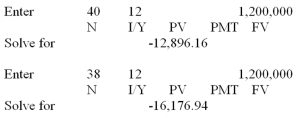Exam 5: Introduction to Valuation: the Time Value of Money
Exam 1: Introduction to Corporate Finance71 Questions
Exam 2: Financial Statements, Taxes, and Cash Flowpart Two: Financial Statements and Long-Term Financial Planning80 Questions
Exam 3: Working With Financial Statements96 Questions
Exam 4: Long-Term Financial Planning and Growthpart Three: Valuation of Future Cash Flows80 Questions
Exam 5: Introduction to Valuation: the Time Value of Money68 Questions
Exam 6: Discounted Cash Flow Valuation129 Questions
Exam 7: Interest Rates and Bond Valuation128 Questions
Exam 8: Stock Valuationpart Four: Capital Budgeting119 Questions
Exam 9: Net Present Value and Other Investment Criteria112 Questions
Exam 10: Making Capital Investment Decisions108 Questions
Exam 11: Project Analysis and Evaluationpart Five: Risk and Return106 Questions
Exam 12: Some Lessons From Capital Market History98 Questions
Exam 13: Return, Risk, and the Security Market Linepart Six: Cost of Capital and Long-Term Financial Policy100 Questions
Exam 14: Cost of Capital100 Questions
Exam 15: Raising Capital90 Questions
Exam 16: Financial Leverage and Capital Structure Policy97 Questions
Exam 17: Dividends and Payout Policypart Seven: Short-Term Financial Planning and Management103 Questions
Exam 18: Short-Term Finance and Planning109 Questions
Exam 19: Cash and Liquidity Management101 Questions
Exam 20: Credit and Inventory Managementpart Eight: Topics in Corporate Finance 97 Questions
Exam 21: International Corporate Finance 99 Questions
Exam 22: Behavioral Finance: Implications for Financial Management 42 Questions
Exam 23: Enterprise Risk Management68 Questions
Exam 24: Options and Corporate Finance106 Questions
Exam 25: Option Valuation 79 Questions
Exam 26: Mergers and Acquisitions89 Questions
Exam 27: Leasing72 Questions
Select questions type
 -Fourteen years ago,your parents set aside $7,500 to help fund your college education.Today,that fund is valued at $26,180.What rate of interest is being earned on this account?
-Fourteen years ago,your parents set aside $7,500 to help fund your college education.Today,that fund is valued at $26,180.What rate of interest is being earned on this account?
(Multiple Choice)
4.9/5  (35)
(35)
 -You want to deposit sufficient money today into a savings account so that you will have $1,000 in the account three years from today.Explain why you could deposit less money today if you could earn 3.5 percent interest rather than 3 percent interest.
-You want to deposit sufficient money today into a savings account so that you will have $1,000 in the account three years from today.Explain why you could deposit less money today if you could earn 3.5 percent interest rather than 3 percent interest.
(Essay)
4.8/5  (44)
(44)
 -Some time ago,Julie purchased eleven acres of land costing $36,900.Today,that land is valued at $214,800.How long has she owned this land if the price of the land has been increasing at 6 percent per year?
-Some time ago,Julie purchased eleven acres of land costing $36,900.Today,that land is valued at $214,800.How long has she owned this land if the price of the land has been increasing at 6 percent per year?
(Multiple Choice)
4.9/5  (28)
(28)
Andy deposited $3,000 this morning into an account that pays 5 percent interest,compounded annually.Barb also deposited $3,000 this morning into an account that pays 5 percent interest,compounded annually.Andy will withdraw his interest earnings and spend it as soon as possible.Barb will reinvest her interest earnings into her account.Given this,which one of the following statements is true?
(Multiple Choice)
5.0/5  (47)
(47)
 -Theo needs $40,000 as a down payment for a house 6 years from now.He earns 2.5 percent on his savings.Theo can either deposit one lump sum today for this purpose or he can wait a year and deposit a lump sum.How much additional money must he deposit if he waits for one year rather than making the deposit today?
-Theo needs $40,000 as a down payment for a house 6 years from now.He earns 2.5 percent on his savings.Theo can either deposit one lump sum today for this purpose or he can wait a year and deposit a lump sum.How much additional money must he deposit if he waits for one year rather than making the deposit today?
(Multiple Choice)
4.8/5  (36)
(36)
 -Ten years ago,Jackson Supply set aside $130,000 in case of a financial emergency.Today,that account has increased in value to $330,592.What rate of interest is the firm earning on this money?
-Ten years ago,Jackson Supply set aside $130,000 in case of a financial emergency.Today,that account has increased in value to $330,592.What rate of interest is the firm earning on this money?
(Multiple Choice)
4.8/5  (44)
(44)
 -Your coin collection contains fifty-four 1941 silver dollars.Your grandparents purchased them for their face value when they were new.These coins have appreciated at a 10 percent annual rate.How much will your collection be worth when you retire in 2060?
-Your coin collection contains fifty-four 1941 silver dollars.Your grandparents purchased them for their face value when they were new.These coins have appreciated at a 10 percent annual rate.How much will your collection be worth when you retire in 2060?
(Multiple Choice)
4.8/5  (31)
(31)
You want to have $1 million in your savings account when you retire.You plan on investing a single lump sum today to fund this goal.You are planning on investing in an account which will pay 7.5 percent annual interest.Which of the following will reduce the amount that you must deposit today if you are to have your desired $1 million on the day you retire?
I.Invest in a different account paying a higher rate of interest.
II.Invest in a different account paying a lower rate of interest.
III.Retire later.
IV.Retire sooner.
(Multiple Choice)
4.8/5  (37)
(37)
Showing 61 - 68 of 68
Filters
- Essay(0)
- Multiple Choice(0)
- Short Answer(0)
- True False(0)
- Matching(0)